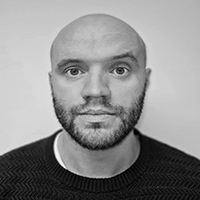The Tippett Medal is a prize for composition awarded by the Royal Musical Association.
For the 2022 award, we actively encouraged submissions from emerging composers from a diverse range of musical practices. We received submissions from a wide variety of compositional practices, including acoustic pieces, music for voice, and mixed instrumental/electronic works. All submissions underwent a blind review process.
The winner of the 2022 Tippett Medal is Simon Knighton for Sound Sculpture no.5 for violin, cello, percussion, baritone and alto saxophone and electronics.

The jury said that this work displays excellent attention to detail in its control of texture, timbre, and space, generating a visceral and engaging experience for the listener. Its distinctive instrumental and electronic soundworld, characterised by resonance, grit, emergence, and immersion, draws the listener in. While some indeterminate or semi-improvised works can lose their way, here the evolution of the sound materials is beautifully paced and logical. The blend of instruments with instrumental samples works particularly well, producing imaginative and colourful hybrid textures that are entirely suited to spatial exploration.
Simon said: “I’m over the moon to receive this award and would like to thank everyone at the Royal Music Association for this great privilege. The piece was the result of a highly collaborative process with the performers, and I would like to acknowledge the wonderful openness and creativity of Gemma Bass, Amy Gray, Peggy Nolan and Carl Raven, without whom the piece wouldn’t have existed!”
The piece can be heard online at: https://youtu.be/N7hnGwbE7cg
Simon Knighton is a composer and sound artist from Sheffield. He is an associate composer with Nonclassical and is currently studying for a PhD at the Royal Northern College of Music under the supervision of Larry Goves and Emily Howard. He is currently working on a series of sound sculptures that explore acoustic, electronic and autonomously produced sound interactions in spatialised settings. By interrogating the meaning and flexibility of the term ‘sound sculpture’, Simon’s music brings areas such as spatialisation, the physicality of materials and the emergent tendencies of system-based procedures to the fore, leading to work that sits on the boundary of concert, installation, ritual and theatre. He enjoys working in close collaboration with performers (inviting them into the composition process wherever possible) and often creates bespoke collaborative methods for each project he undertakes.
Simon has composed concert music for ensembles such as Southbank Sinfonia, Riot Ensemble, Nieuw Ensemble, Ricciotti Ensemble, House of Bedlam, the Dutch National Youth Fanfare Orchestra, CoMA Manchester, Score Collective, Psappha, Camerata Temporalis, the CvA Symphony Orchestra and the I Solisti Wind Ensemble. His music has been performed in the UK, Netherlands, Germany, Belgium and Cuba. Recordings of his work have been released on Nonclassical and broadcast on BBC Radio 3 and BBC Radio 6. His ‘Sound Sculpture No.7’ was nominated for an Ivor Novello award in the best orchestral piece category in 2023.
Simon is also a keen educator. He works as a graduate teaching assistant at the RNCM, teaches privately, and has given talks, conference presentations and workshops at various places around the UK.
In addition, the jury awarded a Highly Commended mention to Robert Laidlow for Silicon Soul for orchestra and electronics. The Jury described this as a beautifully crafted orchestral work that embodies the spirit of compositional innovation by drawing upon AI generated materials from the orchestra’s previous performances. The ambiguity of the combined live and sampled orchestra generates an alluring and evocative soundworld for the listener. The work is characterised by exquisite orchestral textures that appear suspended in time, with excellent control of harmonic transformation.
The premiere of Silicon can be heard online at: https://youtu.be/3xmpywK0ACA?si=dkpAV737pHwXBFjp (Soul is the third movement).
Robert Laidlow’s “gigantically imaginative” (BBC Radio 3) music is concerned with discovering and developing new forms of musical expression through the relationship between advanced technology, scientific collaboration, and live performance. Recent work includes: ‘Silicon’ for orchestra and artificial intelligence, featured in the New York Times and the New Scientist; the piano concerto ‘Warp’, which was awarded the KCL Ivan Juritz Prize for Modernism; and ‘Post-Singularity Songs’ for soprano and electronics. He is a Fellow in Composition at Jesus College, Oxford University, and from 2018-22 he was the PRiSM PhD Researcher in Artificial Intelligence with the BBC Philharmonic.
